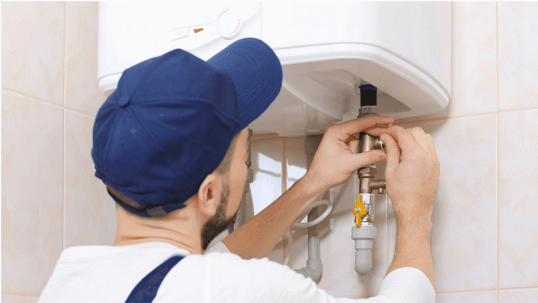Identifying And Solving Everyday Heater Problems
Identifying And Solving Everyday Heater Problems
Blog Article
The author is making a number of good annotation about Common Problems with Tank Water Heaters in general in the content in the next paragraphs.

Envision starting your day without your regular hot shower. That already sets an inadequate tone for the rest of your day.
Every house requires a dependable hot water heater, yet just a couple of know how to manage one. One very easy way to keep your water heater in leading form is to look for faults routinely and repair them as quickly as they show up.
Keep in mind to switch off your water heater before smelling about for faults. These are the water heater faults you are most likely to encounter.
Water as well warm or too cold
Every hot water heater has a thermostat that establishes just how warm the water obtains. If the water entering into your house is too hot despite establishing a hassle-free optimum temperature, your thermostat might be faulty.
On the other hand, also cold water might result from a fallen short thermostat, a broken circuit, or inappropriate gas circulation. For example, if you make use of a gas water heater with a busted pilot burner, you would obtain cold water, even if the thermostat is in best condition. For electrical heating units, a blown fuse may be the culprit.
Insufficient warm water
Water heaters come in numerous dimensions, depending upon your hot water needs. If you lack hot water prior to everyone has actually had a bath, your water heater is as well tiny for your family size. You must consider installing a bigger water heater container or opting for a tankless hot water heater, which takes up much less area and is much more sturdy.
Strange sounds
There go to least five sort of sounds you can hear from a hot water heater, but one of the most usual interpretation is that it's time for the hot water heater to retire.
First off, you must be familiar with the typical appears a water heater makes. An electric heating system may sound different from a gas-powered one.
Popping or banging audios usually mean there is a piece of sediment in your tanks, as well as it's time to cleanse it out. On the other hand, whistling or hissing noises might simply be your shutoffs letting some stress off.
Water leakages
Leaks might originate from pipes, water links, shutoffs, or in the worst-case circumstance, the tank itself. Gradually, water will corrode the storage tank, and also discover its way out. If this occurs, you need to replace your hot water heater asap.
Nonetheless, prior to your adjustment your entire tank, be sure that all pipelines remain in area which each valve functions perfectly. If you still need assistance recognizing a leak, call your plumber.
Rust-colored water
Rust-colored water indicates one of your hot water heater parts is corroded. Maybe the anode rod, or the tank itself. Your plumber will certainly be able to identify which it is.
Lukewarm water
No matter just how high you established the thermostat, you won't obtain any warm water out of a heater well past its prime. A hot water heater's effectiveness might reduce with time.
You will likewise obtain warm water if your pipes have a cross connection. This means that when you turn on a faucet, warm water from the heating system streams in together with routine, cold water. A cross connection is easy to place. If your warm water faucets still follow shutting the hot water heater shutoffs, you have a cross connection.
Discoloured Water
Rust is a major reason for unclean or discoloured water. Corrosion within the water container or a stopping working anode pole can trigger this discolouration. The anode pole protects the storage tank from rusting on the within and need to be checked yearly. Without a pole or a properly working anode pole, the hot water rapidly rusts inside the container. Call a professional water heater specialist to establish if replacing the anode pole will certainly fix the problem; otherwise, replace your water heater.
Final thought
Ideally, your water heater can last 10 years prior to you need a modification. Nonetheless, after the 10-year mark, you might experience any one of these mistakes a lot more frequently. At this moment, you need to add a brand-new hot water heater to your budget plan.
How To Troubleshoot 3 Common Water Heater Problems in Twin Cities
The Water Heater Is Leaking
A leaky cold water inlet valve A loose pipe fitting A leaky temperature and pressure relief valve A corroded anode rod A cracked tank Turn Off Your Water Heater:
Shut off your gas water heater by turning the gas valve on the unit to the “OFF” position. Shut off your electric water by switching its power off at your electrical panel. Look for a two-pole breaker labeled “water heater” and turn it to the “OFF” position. Move the ball valve connected to the water heater to be perpendicular to the piping at a 90° angle. Look for the Leak:
Depending on whether the water is coming from the tank's top or bottom, you’ll want to look for the leak in different locations.
If the leak comes from the top of the tank, carefully look for water escaping from the cold water inlet valve or loose pipe fittings. Rusted hot and cold water valves can have loose connections with the tank, with water leaking out of them.
https://mspplumbingheatingair.com/blog/how-to-troubleshoot-3-common-water-heater-problems
I was shown that editorial about Common Problems with Your Home Water Heater through an acquaintance on our other web blog. Sharing is good. Helping people is fun. Thank you for your time. Kindly check up our site back soon.
Top-notch fix? Dial! Report this page